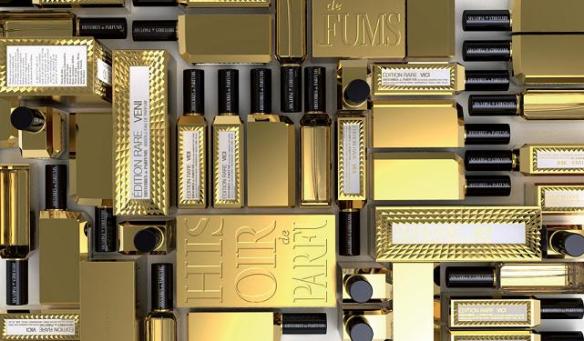Caesar didn’t conquer everything. Vidi and Vici — perfumes from Histoires de Parfums‘ Veni, Vidi, Vici trilogy of perfumes in the Editions Rare Collection — reminds me more of Caesar’s tragic downfall than his stratospheric rise to power and victories. For all that I thought the first perfume in the line, Veni, was a triumph, I found Vidi and Vici to be significantly less so.
As yesterday noted in the Veni review, the 2013 perfume trilogy is a tribute to Caesar’s famous phrase (“I came, I saw, I conquered“) from the Gallic Wars. Each eau de parfum represents a different natural element: Veni focuses on the Earth; Vidi on the Wind; and Vici on the Fire element. Yet, they are all linked by one common olfactory thread: they all have cardamom. This review will focus on the latter two scents in the collection.
VIDI:
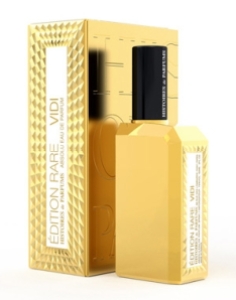 As I explained yesterday, when I first saw the notes for the collection, I didn’t find them very appealing. They seemed odd, discordant, and a very peculiar mix, but Veni was so lovely, it told me that I shouldn’t pre-judge and I should keep an open mind. Nonetheless, as I stared again at the notes for Vidi, the second in the collection, I couldn’t help but swear. As compiled from both Histoires de Parfum‘s description and Fragrantica, Vidi‘s notes are:
As I explained yesterday, when I first saw the notes for the collection, I didn’t find them very appealing. They seemed odd, discordant, and a very peculiar mix, but Veni was so lovely, it told me that I shouldn’t pre-judge and I should keep an open mind. Nonetheless, as I stared again at the notes for Vidi, the second in the collection, I couldn’t help but swear. As compiled from both Histoires de Parfum‘s description and Fragrantica, Vidi‘s notes are:
Top Note: cardamom, cucumber, ozone effects
Heart Note: plastic rose, cyclamen, water effects, saffron
Base Note: immortal absolu, musk, ambergris, vanilla, white wood
Cucumber and cardamon? Ozonic water effects? With maple syrup Immortelle and Cyclamen (which Fragrantica tells me is a pure synthetic meant to be a clean, fresh floral scent)? Plastic rose?
I was determined, however, to keep an open mind, so I sprayed on Vidi and…… Holy Mother of God! Somewhere on a darkened Scottish moor and under a full moon, there are three, blind crones cackling over a cauldron of Vidi while Lady Macbeth frantically tries to scrub off a damned spot of the perfume. Words…. words utterly fail me. Nothing I say will truly describe the unholy hell that is Vidi, but I shall try.
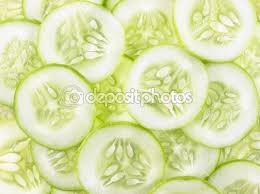 Vidi opens on my skin with an overpowering, nuclear blast of antiseptic mixed with watery cucumber. The abrasive astringent is exactly like the cheap, drugstore acne medicine that teenagers use. Yet, the smell (and the ISO E Super responsible for it) is actually not the real problem. You see, within seconds, the watery, ozonic notes are joined by a shockingly discordant rush of chocolate-y cardamom. For a few minutes, the intensely odd mix of cucumber and cardamom-chocolate duke it out, egged on from the sidelines by an odd, synthetic floral note and by vanilla. It’s so revolting, you have no idea. The vanilla has an eggy quality which clashes with the metallic, aquatic notes as much as everything else. Underneath the whole thing is the cheap, drugstore acne medicine provided by ISO E Super.
Vidi opens on my skin with an overpowering, nuclear blast of antiseptic mixed with watery cucumber. The abrasive astringent is exactly like the cheap, drugstore acne medicine that teenagers use. Yet, the smell (and the ISO E Super responsible for it) is actually not the real problem. You see, within seconds, the watery, ozonic notes are joined by a shockingly discordant rush of chocolate-y cardamom. For a few minutes, the intensely odd mix of cucumber and cardamom-chocolate duke it out, egged on from the sidelines by an odd, synthetic floral note and by vanilla. It’s so revolting, you have no idea. The vanilla has an eggy quality which clashes with the metallic, aquatic notes as much as everything else. Underneath the whole thing is the cheap, drugstore acne medicine provided by ISO E Super.
 Yet, despite all these individual nuances, the overall and primary impression is of watery, green cucumber slathered in thick, heavy chocolate. The synthetic quality to the perfume is profound. As noted, cyclamen is a synthetic, but I suspect that the musk and amber undertones in Vidi must be as well because the perfume starts to create a burning feeling high up in the bridge of my nose. It’s a consistent telltale giveaway for me for truly intense synthetics. As the moments pass, the discordant notes become even more jangly, for lack of a better word. The sweetness is now tinged by maple syrup, while the cucumber has a sharply metallic edge. The vanilla also feels sharp, yet there is some sourness lurking below everything. And the chocolate cardamom doesn’t go with any of it, but especially not with the cucumber.
Yet, despite all these individual nuances, the overall and primary impression is of watery, green cucumber slathered in thick, heavy chocolate. The synthetic quality to the perfume is profound. As noted, cyclamen is a synthetic, but I suspect that the musk and amber undertones in Vidi must be as well because the perfume starts to create a burning feeling high up in the bridge of my nose. It’s a consistent telltale giveaway for me for truly intense synthetics. As the moments pass, the discordant notes become even more jangly, for lack of a better word. The sweetness is now tinged by maple syrup, while the cucumber has a sharply metallic edge. The vanilla also feels sharp, yet there is some sourness lurking below everything. And the chocolate cardamom doesn’t go with any of it, but especially not with the cucumber.
Regular readers know that I will bear with almost anything for the sake of a thorough, full review — and for hours and hours at that. I will endure even notes that feel like urinous panther pee, synthetic, cotton fabric softener, or the ISO E Super that I loathe more than anything. But I couldn’t do it with Vidi. I tried my best but, 15 minutes in, I was actually dry-heaving after every sniff. When a scent triggers a gag reflex, it’s time to throw in the towel.
If you’re interested in other assessments of Vidi, you can try Fragrantica (where one person also gave up due to the almost 80% ISO E Super and Ambroxan, as well as the “plastic cucumber”), Lucas’ very ambivalent, dubious review for Chemist in The Bottle, or Ines’ assessment on All I Am — A Redhead. Normally, I would quote a few comparative assessments, but the mere memory of Vidi makes me want to gag. If you want my opinion, I would stay far away from Vidi.
VICI:
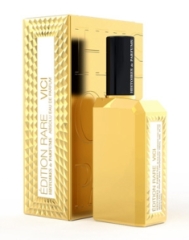 If Veni was meant to evoke the Earth and Vidi meant to evoke Water, then Vici is centered on the last element, Fire. The notes, according to Histoires de Parfums and Fragrantica, are:
If Veni was meant to evoke the Earth and Vidi meant to evoke Water, then Vici is centered on the last element, Fire. The notes, according to Histoires de Parfums and Fragrantica, are:
Top Note: angelical roots [angelica], cardamom, pink peppercorns, basil, galbanum, aldehyde
Heart Note: rustic lavender effects, céleri graine [celery seed], iris concrete, osmanthus absolu, essence incense
Base Note: patchouli oil, musk, vanilla, cedar, raspberry.
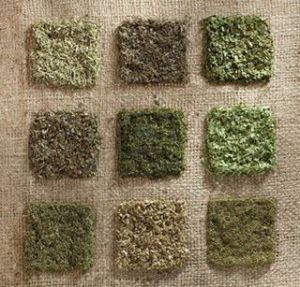 Vici didn’t evoke either fire or “victory,” in my mind. Instead, it felt like nothing more than the dark recesses of a very dusty, very old herbal shop lined with cedar and potpourri. Vici is an incredibly dry, acrid, dusty herbal scent, in my opinion, that evokes a landscape of desiccated green colours. It opens on my skin with incredibly arid, pungent, dry basil with heaping amounts of what smells like dried mint and dried tarragon, along smaller doses of dried angelica, dried violet leaves, and dried red fruits. If you sense a theme emerging, you’re not mistaken. Have I mentioned the word “dry” yet?
Vici didn’t evoke either fire or “victory,” in my mind. Instead, it felt like nothing more than the dark recesses of a very dusty, very old herbal shop lined with cedar and potpourri. Vici is an incredibly dry, acrid, dusty herbal scent, in my opinion, that evokes a landscape of desiccated green colours. It opens on my skin with incredibly arid, pungent, dry basil with heaping amounts of what smells like dried mint and dried tarragon, along smaller doses of dried angelica, dried violet leaves, and dried red fruits. If you sense a theme emerging, you’re not mistaken. Have I mentioned the word “dry” yet?
The overpowering impression is of dried green leaves from one’s pantry or kitchen cabinet, atop a base of musk, cedar and dried potpourri-like patchouli. Smoke flickers in the background, as does ISO E Super, though it’s nothing like the tidal wave blast in Vidi. Nothing in Vici evokes fire or richness to me; there is nothing that is either fresh and juicy like fruit, nor sumptuously molten like lava. It’s simply a desiccated landscape dominated by dry, green kitchen herbs.
Vici doesn’t change significantly with the passage of time. Thirty minutes in, the dried herbal angelica and celery seed notes rise to the surface, accompanied by what smells like dried green tea. I assume the latter stems from the osmanthus which can sometimes have a tea-like character but, here, it’s as dried as everything else. The remaining notes — like the violet leaves — have dropped away, leaving only an impression of vague, abstract woods. Thankfully, the ISO E Super has also retreated. In its place is a flicker of raspberry that pops up every now and then before flitting away. The whole thing is incredibly low in sillage and feels very thin. Less than an hour into Vici’s development, the perfume morphs into a very muted, amorphous, general sense of dried green herbs and lightly musked, peppered woods. The raspberry flickers occasionally, the ISO E Super is always there in the background, but the perfume is primarily abstract, dry, green and woody. Vici remains that way for a few more hours, becoming sheerer and more amorphous with every passing hour until, finally, about 4.5 hours later, it fades away as nothing more than abstract woody musk.
Vici wasn’t a terrible perfume, but it’s not a great one, either. Frankly, I didn’t think it was very special, and it’s certainly not worth $175 in my opinion. Even apart from the sillage and longevity issues, it lacks great depth, body, richness and balance. There is little to counter the overpoweringly arid, almost bitter, nature of the perfume. And, frankly, I’m not keen to smell like the inside of my pantry’s dried herbs section. A greater sin perhaps is that the perfume was fundamentally boring, in my opinion. I can barely summon up the energy to describe it at greater length — and regular readers will know that I love details. But Vici leaves me feeling so utterly apathetic and disinterested, that I shall end this review here and now.


